3-day international conference on psychology of religion, spirituality
February 24-26, 2020 by the Department of Psychology, Aligarh Muslim University, Aligarh in collaboration with the Institute of Objective Studies, New Delhi
A three-day International Conference on “Psychology of Religion and Spirituality” was organised on 24th, 25th & 26th February 2020, by the Department of Psychology, Aligarh Muslim University, Aligarh in collaboration with the Institute of Objective Studies, New Delhi, and Centre for Study and Research, Hyderabad, at Aligarh Muslim University, Aligarh. The conference was well attended by scholars and researches, in which 82 papers were presented.
Preceding the ICPRS Conference, the Department of Psychology, AMU, Aligarh, in collaboration with the Student’s Counseling Centre, AMU, Aligarh also organised a Pre-Conference Workshop on the “Role of Spirituality for Counselors and Health Care Professionals” held on February 22, 2020 in the Conference Hall of the Faculty of Social Sciences, A.M.U., Aligarh.
Day 1 (February 24, 2020)
Inaugural Function
Time: 10:00 a.m. to 11:50 a.m.
Venue: Polytechnic Assembly Hall (Boys), AMU
The Inaugural function of the Conference held at the Polytechnic Assembly Hall (Boys) on 24th Feb, 2020, at 10:00 a.m. was presided over by the Chief Guest Prof. V. K. Goswami (former VC, Sangam University and Sunrise University). The Guests of Honor of the function were Mr. Mohammad Muqim (Coordinator, IOS Aligarh Chapter) and Prof. Girishwar Misra (former VC, Mahatma Gandhi Antarrashtriya Hindi Vishwavidhyalaya). Other dignitaries on the dais were Prof. Akbar Husain (Director, ICPRS & Dean, faculty of Social Sciences, AMU, Aligarh), and Prof. Roomana N. Siddiqui (Organizing Secretary, ICPRS & Chairperson, deptt. of Psychology, AMU, Aligarh).
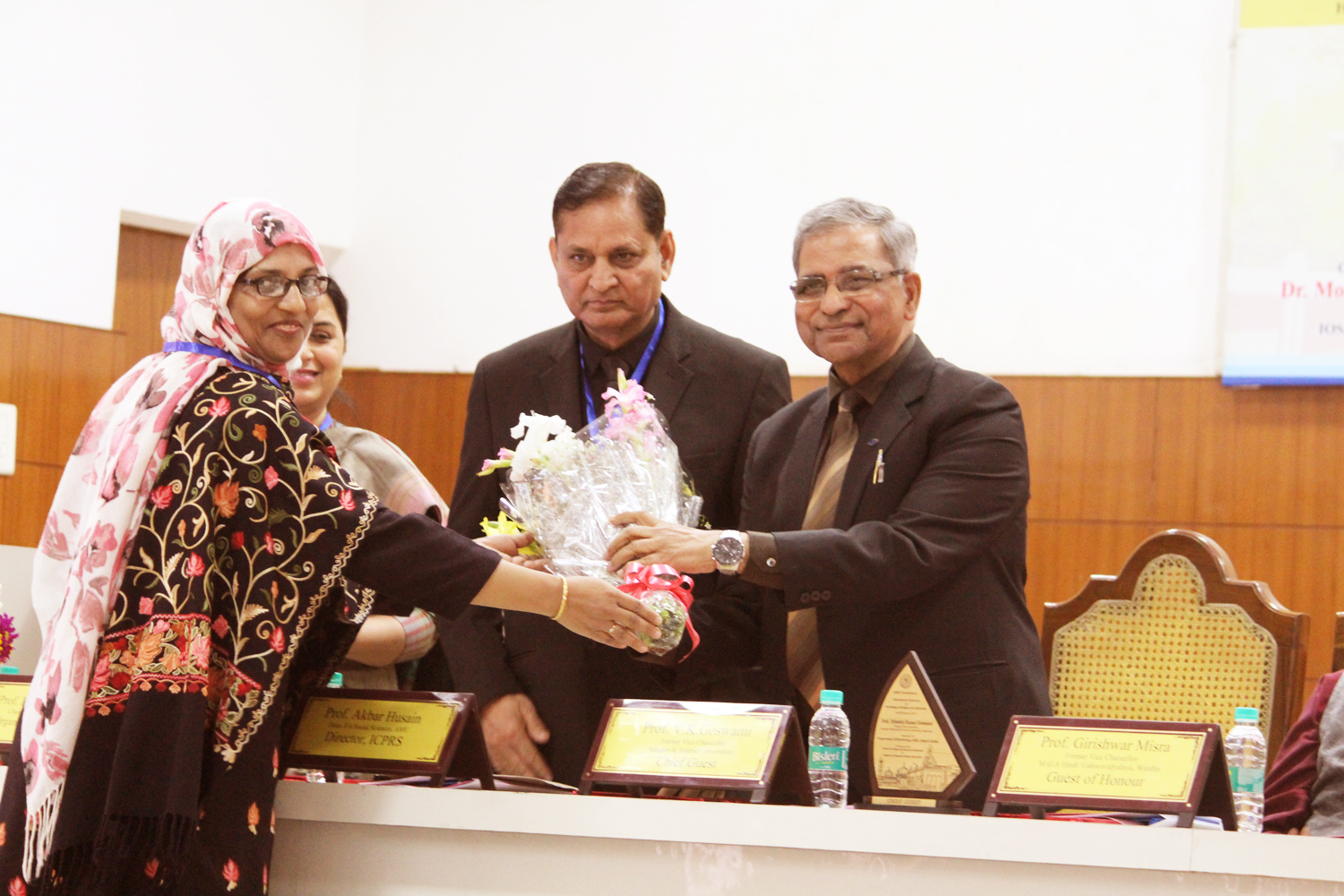
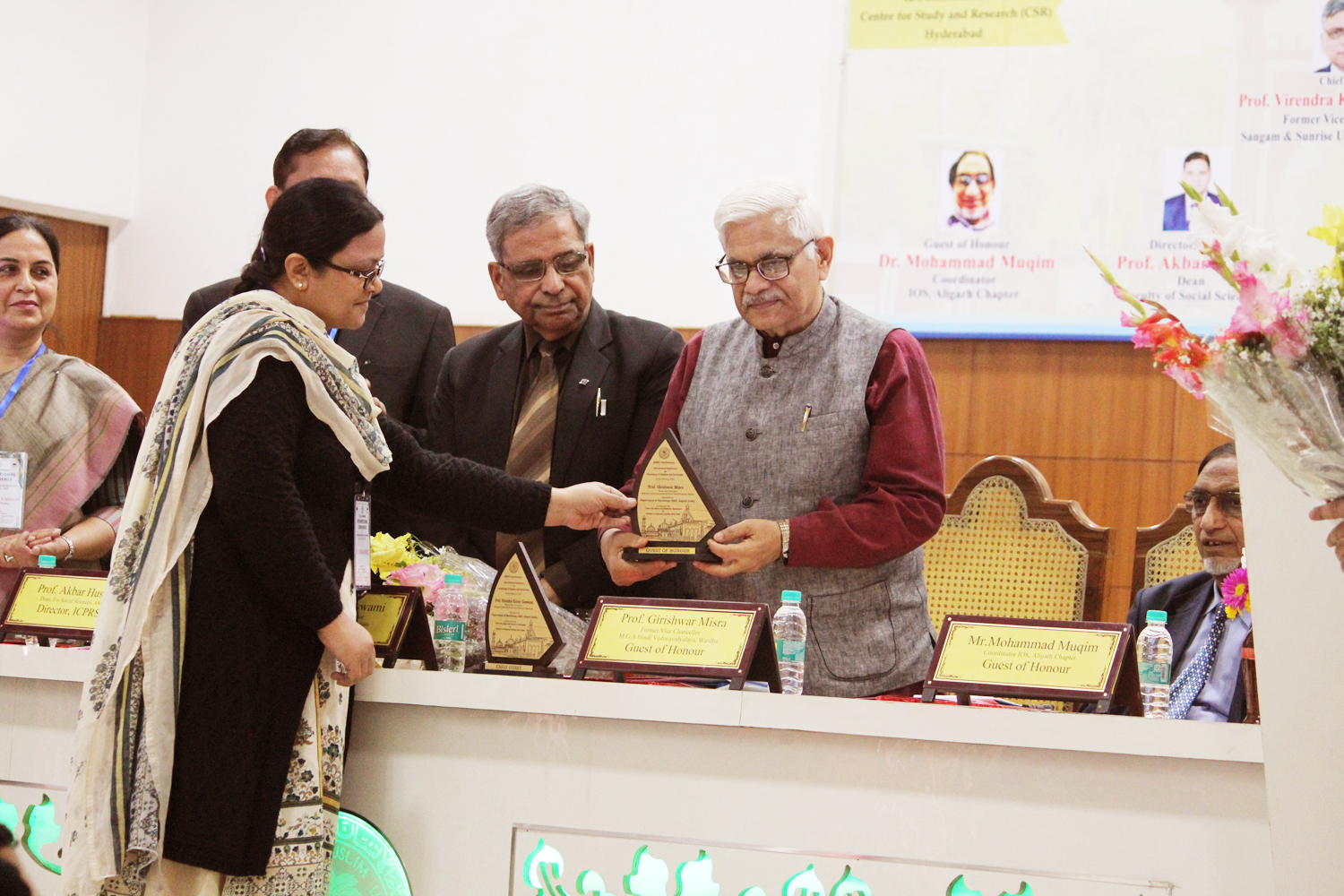
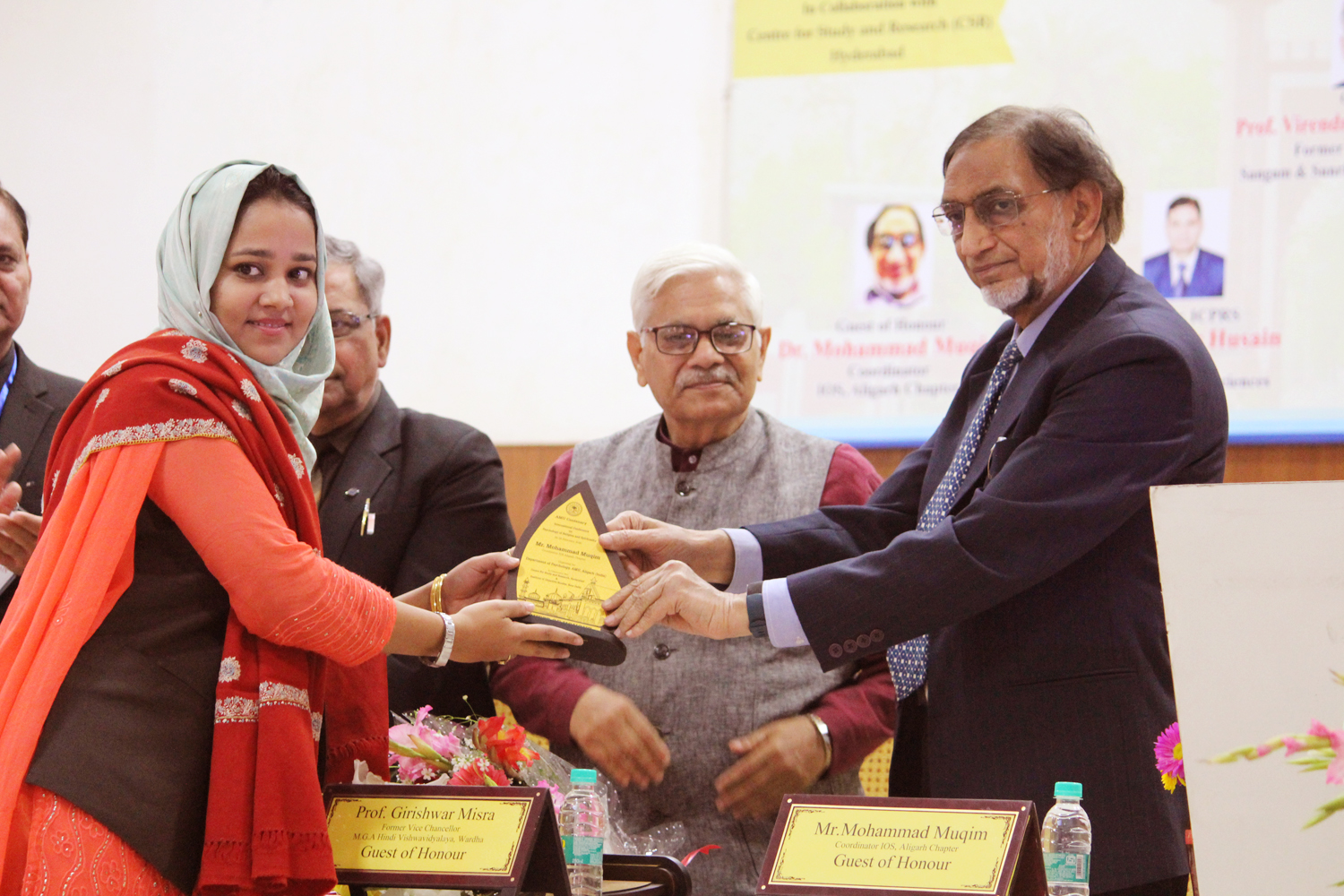
Inaugural Function hosted by Dr. S. Reshma Jamal (Assistant Professor, deptt. of Psychology, AMU) commenced with recitation from the Holy Quran. Thereafter, Prof. Roomana N. Siddiqui, delivered the welcome address where she extended a warm welcome to the delegates. In her opening remarks, she said that the Psychology of Religion and Spirituality is a very important division in the American Psychological Association, and it is dedicated to the promotion of psychological theories, research and clinical practices that facilitate the understanding of religion and spirituality in the lives of people. She then expressed gratitude to the outstation and international delegates for making it possible to attend the conference. She wished that the three-day deliberations would open new avenues for collaboration of science, religion and spirituality. She concluded by congratulating the organizers, collaborators, faculty members, and the organising team of the conference. Then mementos were presented.

Prof. Akbar Husain, in his address, shed light on the theme of the conference saying that spirituality is a realm of causality which unites all humankind within a framework of beliefs, experiences, and practices that eventually develops a sense of harmony and bliss. In contrast, religion is an assortment of beliefs and practices shared by a group of individuals concerning their relationship with the Supreme. It intends to stimulate spiritual cognizance, which eliminates suffering from the apparent level of existence and induce solidarity, harmony, and an ineffable ecstasy. In his concluding remarks, he said that he is overwhelmed to see the interest and prodigious participation of eminent thinkers, researchers, educationists, and students from various national and international institutions for enlarging the sphere of spiritual and religious psychology.
Later, the souvenir and abstracts were released by Prof. Girishwar Misra.
Mr. Mohammed Muqim mentioned that psychology is an integral science dealing with the nuances of complex human behaviour. He added that religion being a personal relationship with God significantly embraces this field. Moreover, he said that human beings are not merely limited to their physical selves; thus any study related to them should focus on the holistic aspects of the human self. In this direction, the subtleties associated with spirituality offers inclusive ways of living, rendering a life filled with clarity and integrity.
Prof. Girishwar Misra, in his keynote address, explained the psychological perspectives on spirituality with particular emphasis on conceptual and applied concerns. More specifically, he said that scholars in the present time are pursuing investigations about the potential influence and role of spirituality in the fields of health, well-being, education, work, and family. He added that numerous traditions are endorsed across the globe, which focuses on the search for the sacred. In continuation, he said that these liberating efforts transform the person and make him or her more inclusive. He appreciated modern approaches in the realm of spirituality, which have paved the way for integrating science and spirituality. There is a dire need for learning the nuanced ways about the processes and consequences of spiritual modelling, the relationship of spirituality with health, effects of meditation, attachment to divinities, spiritual creativity, spirituality and self-regulation, and relation of spirituality and emotions, he concluded.
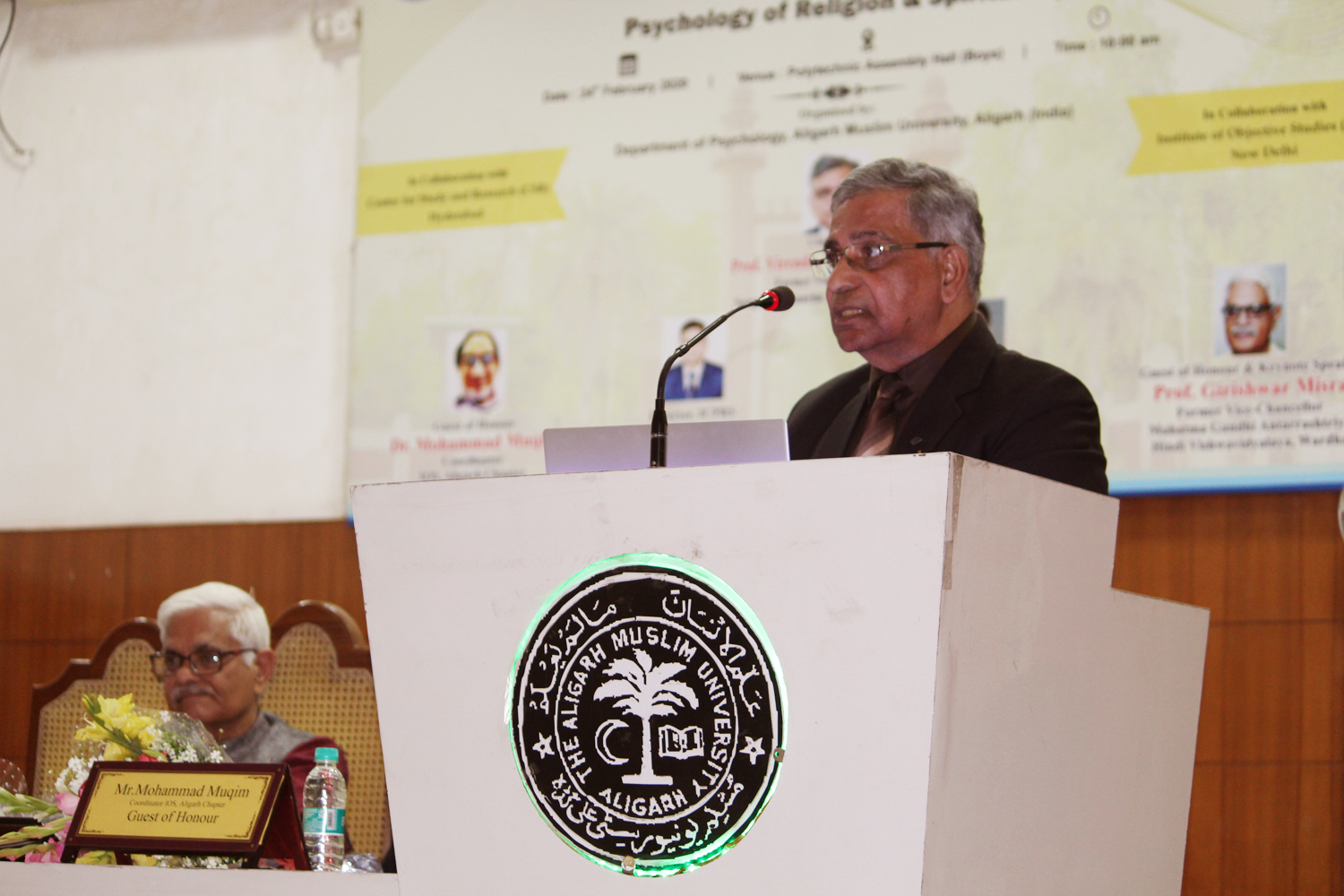
The Chief Guest, Prof. V. K. Goswami in his address, exquisitely dwelled upon the idea of synchronizing Science, and Spirituality for establishing peace. He stated that spirituality being the science of soul is intrinsic by nature and transcending the five senses. He dwelt on the nuances of science and stated that it is logical, analytical, and systematic knowledge of global phenomena backed with experimental proof. He also enlightened everyone about peace equation and said that peace is inversely proportional to entropy, i.e., disorderliness. He also talked about two models developed by him, “VG: Hub & Spoke Model” and “VG: Life (L) Circle Model”. Science and Spirituality together mint the coin of peace.
In the end, Dr. Shah Mohd. Khan (Associate Professor, deptt of. Psychology, AMU, Aligarh) delivered the vote of thanks, which was followed by the University tarana and the National Anthem.
Invited Lectures Day 1
Time: 12:45 p.m. – 2:15 p.m.
Venue: Polytechnic Assembly Hall (Boys), AMU
After the Inaugural function and high tea, the session comprising of Invited Lectures was conducted in the Polytechnic Assembly Hall (Boys). The session being chaired by Prof. V. K. Goswami started at 12:45 p.m., where four eminent speakers (Prof. Parul Rishi, Prof. Novrattan Sharma, Prof. Nilanjana Sanyal, and Dr. A. A. Qadri) delivered their Invited Lectures.
Professor Nilanjana Sanyal (Univ. of Calcutta, Kolkata) was the first to deliver her speech. She spoke on “Detachment: A Gerotranscendent Spiritual Practice in Autumn of Life Stage”.
Professor Parul Rishi (Indian Institute of Forest Management, Bhopal) talked about “Spiritual Intelligence and Mindfulness across Indian Religions-Meditating Role of Subjective well-being and coping with stress”.
Prof. Novrattan Sharma (deptt. of Psychology, M.D. University, Rohtak, Haryana) delivered a talk on “Configure Religiosity and Spirituality for the Development of Positive Mental Health”.
Last speech was delivered by Dr. A. A. Qadri (Director, Mental Health Centre, Aurangabad, Maharashtra), who expressed his views about “Islam and Spirituality in the management of Psychiatric Patients”.
Concluding remarks were given by Professor V. K. Goswami, who stated that there is a need to simultaneously promote scientific research, spirituality and peace. The session concluded at 2:15 p.m.
Scientific Sessions
Time: 3:15 p.m. to 5:00 p.m.
Venue: Department of Psychology, A.M.U
Parallel Scientific Session I (3:15-5:00 p.m.)
The Scientific Session I was commenced in the PG Lab I of the Department of Psychology, Arts Faculty Building, AMU. The session was chaired by Dr. Nadeem Kirmani and co-chaired by Dr. Salma Kaneez, in which seven international and two local delegates presented their papers.
The Scientific Session II was held in PG Lab II of the Department of Psychology. The session was chaired by Prof. Parul Rishi and co-chaired by Mr. Usama Rehman, in which six papers were presented by the delegates.
The Scientific Session III was held in the Smart Class Room No. 13, and was chaired by Prof. Mohd. Ghufran and co-chaired by Dr. Fauzia Nazam, in which five papers were presented.
These three sessions marked the end of Day One of the conference.
Day 2 (February 25, 2020)
Venue: Department of Psychology and Arts Faculty Lounge, A.M.U.
Parallel Scientific Session I (9:30-11:00 a.m.)
The Scientific Session I was devoted to the Invited Lectures held at the Arts Faculty Lounge, AMU, Aligarh. The session began at 9:30 a.m. where three invited lectures were delivered by distinguished scholars. The session was chaired by Prof. Suneetha B. Maryam, and Dr. Pepper McDonald co-chaired this session.
The session comprising three Invited Lectures, was initiated by Prof. Mohammad Ghufran (Kumaun University, Almora, Uttrakhand). He talked on “Islamic Approach of Counseling” wherein he attempted to explain asabiyyah or prejudice from an Islamic perspective as well as from the standpoint of mainstream psychology.
Dr. Thomas B. Idiculla (Director, Harvard Medical School), spoke on “Spirituality in the Context of Mental Health Assessment, Intervention and Outcomes: Experiences in The U.S., India and The Middle East.”.
Dr. Mustafa Nadeem Kirmani (Associate Professor, Amity University, Haryana) lectured on “Psychology of Peace: Quranic Model”.
The concluding remarks were given by Prof. Suneetha B. Maryam.
Scientific Session II was held in PG Lab II of the Department of Psychology. The session, commencing at 9:30 a.m. was chaired by Prof. Showkat Ahmad Shah and co-chaired by Dr. Heena Parveen, in which five papers were presented by the delegates.
Scientific Session III was held in the PG Lab II of the Department of Psychology and it was chaired by Dr. Shah M. Khan and co-chaired by Dr. Sarah Javed, in which six papers were presented by delegates.
These three sessions marked the end of the first parallel scientific sessions of the second day of the conference.
Parallel Scientific Session II (11:30 a.m. - 1:30 p.m.)
The second set of parallel sessions began in the Department of Psychology at 11:30 a.m.
Scientific Session IV of the second day was commenced in the PG Lab I of the Department of Psychology. The session was chaired by Dr. Prof. Musaddiq Jahan and Co-chaired by Dr. Maha Fathima Gani, in which six papers were presented.
Scientific Session V was held in PG Lab II of the Department of Psychology. The session was chaired by Dr. Asma Khatoon and co-chaired by Dr. Nasheed Imtiaz. In this session, seven papers were presented by the delegates.
Scientific Session VI was held in the Arts Faculty Lounge and was chaired by Prof. Mahmood S. Khan and co-chaired by Dr. S. Reshma Jamal. The session began with the invited lecture delivered by Prof. Neena Kohli (University of Allahabad, Allahabad) on “Religiosity, Spirituality, and Well-being: Search for links.”.
Dr. Abbas Bakhahandeh Bali (Asstt. Prof. of Philosophy, University of Mazandaran, Iran) spoke on “A Comparative Study of Ibn Sina and Ibn Arabi’s views on Spiritual Self-Actualization.”.
Five papers were presented by delegates of the conference. This marked the end of the second set of parallel sessions of the second day of the conference.
Parallel Scientific Session III (2:45 p.m. - 5:00 p.m.)
The next set of scientific sessions of Day 2 commenced at 2:45 p.m. in which three parallel sessions were organized.
Scientific Session VII began in the PG Lab I of the Psychology Department, Arts Faculty. The session was chaired by Dr. Kr. Sajid Ali Khan and co-chaired by Dr. Geetanjali Roy, in which 13 papers were presented.
Scientific Session VIII of the second day was held in PG Lab II of the psychology department. The session was chaired by Dr. Javed Alam and co-chaired by Dr. Abbas Bakhshandeh Bali, in which nine papers were presented by the delegates.
Scientific Session IX was held in the Arts Faculty Lounge and was chaired by Prof. Neena Kohli and co-chaired by Dr. Asif Hasan, in which eleven papers were presented by the local, outstation and international delegates of the conference.
These three sessions marked the end of Day 2 of the conference.
Day 3 (February 26, 2020)
Venue: UGC-HRD Centre, A.M.U
Workshop: Communion with God: Meditation (Time: 9:30 a.m. to 10:20 a.m.)
On Day 3, a workshop was conducted at 9:30 am, by Mr. B. K. Satya Prakash Sharma (Brahma Kumaris) on “Communion with God: Meditation”.
Invited Lectures
Time: 10:30 a.m. – 11:30 a.m.
Venue: UGC-HRD Centre, A.M.U.
Two Invited Lectures were delivered by the Invited Guests from 10:30 a.m. onwards.
Prof. Naved Iqbal (Jamia Millia Islamia, New Delhi) delivered his talk on “Islamic Psychology: Background of emergence and current challenges”.
Dr. Shah Mohd. Khan, (Associate Professor, deptt. of Psychology) delivered his lecture on the “Quranic Verses and effects on Human Emotion”.
With this, the sessions of the conference came to an end.
Valedictory Function
Time: 12:00 p.m. to 1:00 p.m.
Venue: UGC-HRD Centre, A.M.U.
The valedictory function of the Conference held at the UGC-HRD Centre on 26th February, 2020, at 12:00 noon was presided over by the chief guest Prof. Akhtar Haseeb (Pro-Vice-Chancellor, A.M.U., Aligarh). The Guest of Honour and Keynote speaker of the function was Prof. Braj Bhushan (IIT, Kanpur). Other dignitaries on the dais were Prof. Akbar Husain (Director, ICPRS and Dean, F/o. Social Sciences, AMU) and Prof. Roomana N. Siddiqui (Organizing Secretary, ICPRS and Chairperson, D/o. Psychology, AMU, Aligarh).
The valedictory function was anchored by Dr. Ali Hur Kamoonpuri (Assistant Professor, D/o. Arabic, AMU). It commenced with the recitation from the Holy Quran and thereafter Prof. Akbar Husain delivered the welcome address where he extended a warm welcome to the distinguished guests and delegates. In his opening remarks, he briefly shed light on the theme of the conference, followed by expression of gratitude to the guests, the delegates of the conference, the organizers, the collaborators, faculty members, and the team of the conference. Mementos were presented.
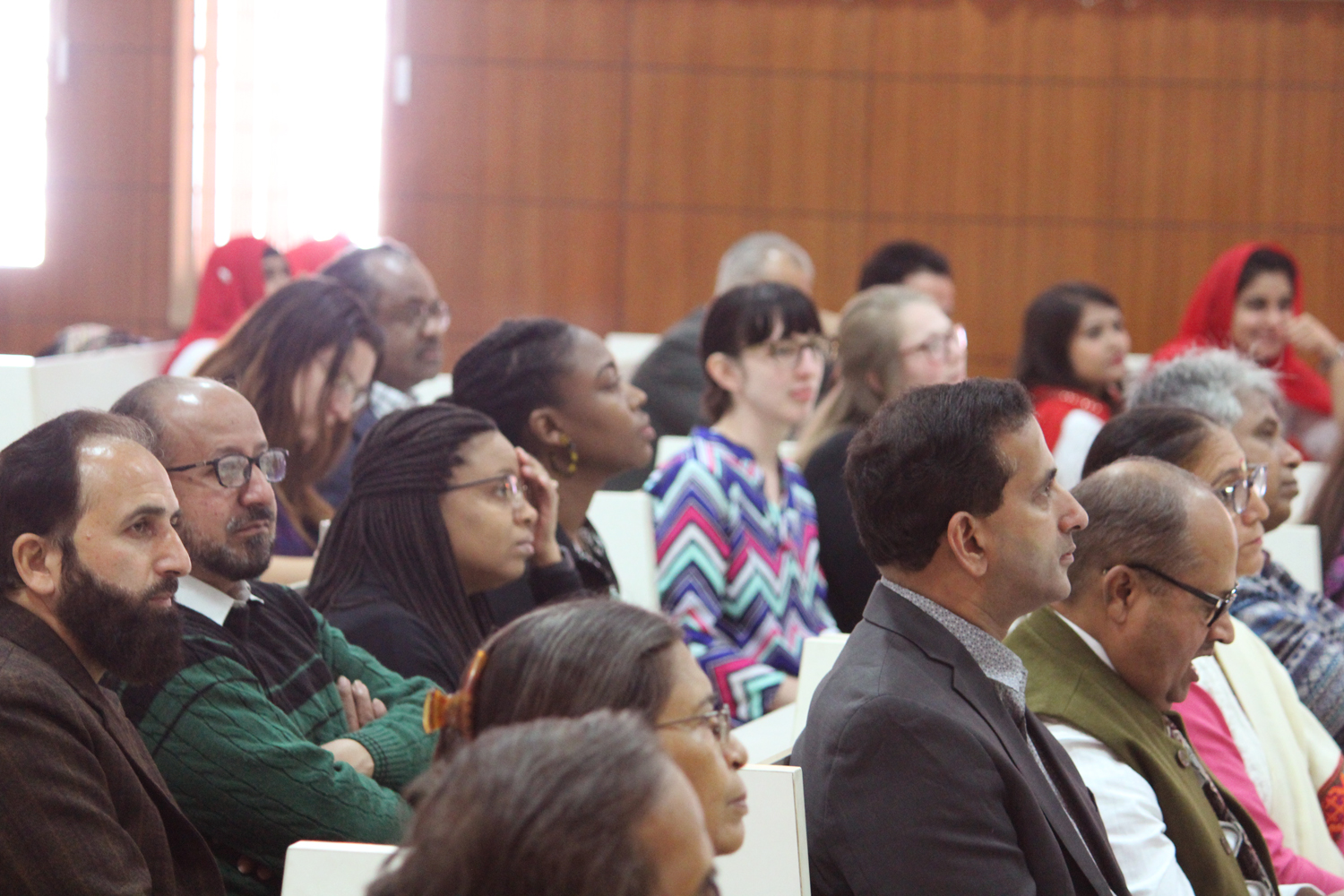
Prof. Braj Bhushan delivered the Keynote address, where he enlightened the audience on the theme of the conference. He also spoke on “Functional Integrity of Cerebral Regions and Self-reported Spiritual Experiences”. He said that spirituality is widely studied and reported by researchers of psychology and other disciplines in India. One of the striking features of such behavioural studies is the administration of Western tools on the Indian population. Considering the difference in the conceptualizations of self and assessment of culturally-rooted constructs, using Western psychometric tools, a set of studies examining the neuropsychological indices of the functional integrity of cerebral regions and self-reported spiritual experiences. He succinctly summarized the empirical findings pertaining to cultures, ethnicities, and religions.
Prof. Roomana N. Siddiqui presented the report of the AMU Centenary International Conference on Psychology of Religion and Spirituality.
The chief guest, Prof. Akhtar Haseeb, in his presidential address, spoke on the need for exploring the realm of the psychology of religion and spirituality. He said that spirituality deals with seeking meaningful connections with the divine and leads to the experience of positive emotions. He added that the path of spiritual solace imparts compassion, the capacity for love and forgiveness, altruism, and joy which can be acquired through meditation, prayer, affirmation, yoga or specific spiritual and religious practices. He concluded by saying that spirituality and religion is a way of gaining perspective, recognizing our role in life, which serves a larger purpose than simply what we do every day. It provides the insight to rise beyond material existence and find solace in life. Thus one must continuously strive for spiritual actualization.
In the end, Dr. Nasheed Imtiaz (Assistant Professor, D/o. Psychology, AMU, Aligarh) delivered the vote of thanks, which was followed by the University tarana and the National Anthem. The Valedictory function concluded at 1:15 p.m.
Summary of the ICPRS Report
The three-day International Conference on Psychology of Religion and Spirituality, orchestrated by the dedicated efforts of Professor Akbar Husain, Director ICPRS and Dean, Faculty of Social Sciences, AMU, Professor Roomana N. Siddiqui, Organizing Secretary, and Chairperson, Department of Psychology, AMU, Dr. Mohammad Manzoor Alam, (Collaborator ICPRS) Chairman, IOS, New Delhi, and Prof. Mohammad Rafat, (Collaborator ICPRS) Director, CSR, Hyderabad, successfully concluded on Feb 26, 2020. Where in total, 12 invited lectures were delivered by the distinguished delegates of the conference namely, Prof. Harold G. Koenig, Dr. Thomas B. Idiculla, Prof. Parul Rishi, Prof. Nov Rattan Sharma, Dr. Abbas Bakhshandeh Bali, Dr. Mustafa Nadeem Kirmani, Prof. Mohammad Ghufran, Prof. Neena Kohli, Prof. Nilanjana Sanyal, Prof. Naved Iqbal, Dr. A. A. Qadri and Dr. Shah Mohd. Khan. Throughout the 12 sessions of the conference, 82 papers were presented by the local, outstation, and international delegates of the conference. Besides this, two keynote addresses were also delivered by Prof. Girishwar Misra, former VC, M.G. Antarrashtriya Hindi Vishvidyalaya, and Prof. Braj Bhushan, IIT, Kanpur on the respective themes “Psychological Perspectives on Spirituality: Some Conceptual and Applied Concerns” and “Functional Integrity of Cerebral Regions and Self-Reported Spiritual Experiences.” Moreover, two workshops were also conducted. One of the workshops was a pre-conference workshop organized in collaboration with the Student’s Counseling Centre, AMU, Aligarh on the theme “Role of Spirituality for Counselors and Health Care Professionals” held on February 22, 2020, and it was facilitated by Prof. Suneetha B. Maryam and Dr. Pepper McDonald (Mercer University, Georgia). The other workshop was organized on the last day of the conference, i.e., February 26, 2020, on the theme “Communion with God: Meditation” by BK Satya Prakash Sharma from the Brahma Kumaris. Eventually, the conference reached its conclusion and opened new avenues in the field of Psychology of Religion and Spirituality.
Go Back